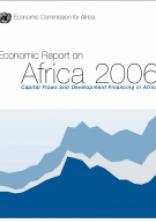Economic Report on Africa 2006

African countries continue to face perennial shortages of resources to finance public and private investment. This constrains their ability to accelerate growth, seen as key to reducing poverty. Resource shortages limit the ability of governments to undertake public expenditure in infrastructure and social services needed to boost economic demand, encourage private sector activity, and sustain high levels of economic growth.
To fill the financing gaps and accelerate growth, African countries need to mobilize more domestic and external financial resources. The fact is, official development assistance (ODA) to Africa has grown only in nominal terms, and the resources received over the last decade - excluding emergency aid and debt relief - increased only marginally. But while countries on the continent still depend heavily on aid for development, it is encouraging to note that they are attracting more private capital. Indeed, net flows of private capital have risen, as net official flows have declined and turned negative over the past years.
However, private capital flows remain unequally distributed across the continent, with oil-rich countries taking the lion’s share. The concentration of foreign investment in the extractive industries perpetuates Africa’s dependence on primary commodities, and exposes the continent to the adverse effects of fluctuations in international commodity prices. For this reason, African must attract more foreign capital, and establish incentive mechanisms to encourage a more diversified allocation of capital across sectors. It is also urgent to monitor and manage capital flows effectively so as to minimize the risks of financial instability.